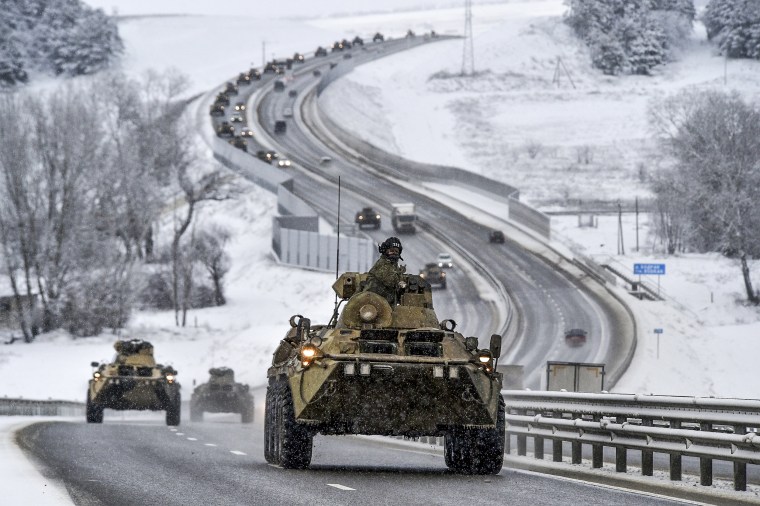WASHINGTON — President Joe Biden said Tuesday that he has "no intention" of moving U.S. forces into Ukraine, making the comments as his administration considers a range of economic measures to punish Russia if it invades the neighboring country.
Any deployment of U.S. troops would be to reinforce NATO forces under the alliance's Article 5 obligations if Russia continues its military buildup on Ukraine's border or moves in, Biden said.
The president added that a deployment decision would be based on what Russian President Vladimir Putin decides to do, adding, "I may be moving some of those troops in the nearer term, just because it takes time."
Asked if he felt the likelihood of a Russian invasion was increasing or decreasing, Biden said, “I'll be completely honest with you, it’s a little bit like reading tea leaves."
“There will be enormous consequences if he were to go in and invade, as he could, the entire country or a lot less than that as well, for Russia, not only in terms of economic consequences and political consequences, but enormous consequences worldwide," Biden added. "This would be the largest — if he were to move in with all those forces — it would the largest invasion since World War II. It would change the world."
The administration is speaking to allies about taking a range of potential actions against Russia, which has massed an estimated 100,000 troops on the Ukraine border. On Tuesday, a senior administration official said the White House is considering barring tech exports to Russia as a way of targeting its strategic sectors if it invades Ukraine.
These "novel export controls" would be imposed in addition to sanctions and would have a similar, damaging effect, the official said. Under the plan, the administration would block Russia from obtaining U.S.-originated software and technology in order to harm key economic sectors, such as artificial intelligence, aerospace and quantum computing, the official said.
The goal would be to deliberately target sectors that Russian President Vladimir Putin has championed as a way for Russia to diversify its economy beyond oil and gas.

The news of the plans come as Russia held military drills across its territory Tuesday amid concerns it could invade Ukraine. The administration official suggested that the U.S. and European Union are unified in their position on imposing possible sanctions on Russia, describing them as unprecedented measures with massive consequences. The financial sanctions could be incredibly “potent” in ways that affect Putin’s calculus, the official said.
On Capitol Hill, bipartisan efforts are underway to hit Russia with harsh sanctions if Putin makes a move on Ukraine. Sen. Bob Menendez, chairman of the Foreign Relations Committee, told reporters Tuesday that a group of Senate Republicans and Democrats met virtually the previous night to discuss "sanctions that would be devastating to Russia's economy, that would de-plug it from the international financial transactions system.”
Sen. Lindsey Graham, R-S.C., said in a separate news conference Tuesday that he was on the call with Menendez, D-N.J., and other senators "to try to come up with an agenda next week that would send a message to Putin that the cost of going into the Ukraine is going to be greater, not less for Russia.” Unlike Menendez, though, Graham and many other congressional Republicans want to impose sanctions before a potential invasion.
Ahead of Russia's military exercises, the Pentagon placed 8,500 U.S. troops on “heightened alert” to assist with the defense of NATO allies. Pentagon spokesman John Kirby told reporters Monday that no decisions had been made yet “to deploy forces from the United States at this time.”
White House press secretary Jen Psaki said Tuesday that any decision to deploy military forces would be made in coordination with NATO and other allies. When asked whether a Russian invasion of Ukraine was imminent, Psaki said, "No one can get into the mind of President Putin or Russian leadership."
"So while, of course, our preferred path is diplomacy and we can't predict where the mind of President Putin is, we've certainly seen aggressive actions and preparations increasing at the border," she said, referring to Russia's military buildup at the Ukraine border and reported misinformation efforts.
Biden also spoke with European leaders Monday on a video call about joint efforts to deter further Russian aggression. He said they discussed “preparations to impose severe economic costs on Russia and reinforce security on the eastern flank.”
A bipartisan congressional delegation, meanwhile, left Tuesday for Ukraine, led by Rep. Gregory Meeks, D-N.Y., chairman of the House Foreign Affairs Committee. They will meet with representatives from NATO, the E.U. and U.S. allies in Brussels “to discuss the security situation in Eastern Europe and the buildup of Russian troops along Ukraine’s border and in Belarus,” according to a preview of the trip. The lawmakers will also meet with senior Ukrainian officials in Kyiv “to discuss the security situation and reinforce U.S. support for Ukrainian sovereignty and territorial integrity.”
Two classified briefings will be provided to congressional leadership aides and committee staff on the situation in Ukraine on Tuesday, Democratic aides said. House Speaker Nancy Pelosi, D-Calif., and Senate Majority Leader Chuck Schumer, D-N.Y., have both requested all-member bipartisan briefings on the situation involving Russia and Ukraine next week. Lawmakers are currently on recess and home in their districts this week.
Senate Minority Leader Mitch McConnell, R-Ky., said at a news briefing in Kentucky on Tuesday that he had spoken with the White House about the situation and what he was hearing of the administration's plans since the weekend is "encouraging," including that it was "prepared to take steps before an incursion and not afterwards."
“But it appears to me the administration moving in the right direction,” he said.
Over the weekend, the State Department said Americans in Ukraine should consider leaving the country. Nonemergency diplomatic employees were allowed to depart, and eligible family members were ordered to evacuate.
